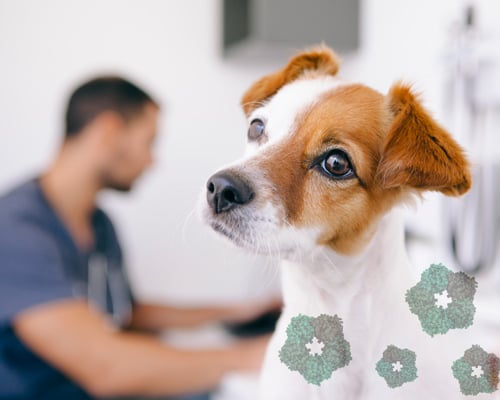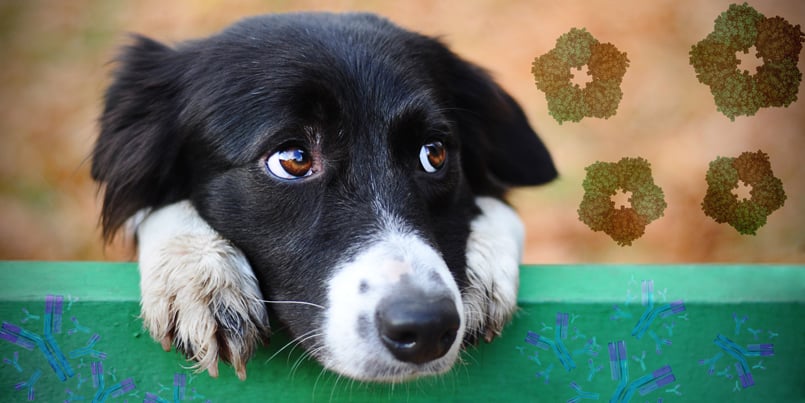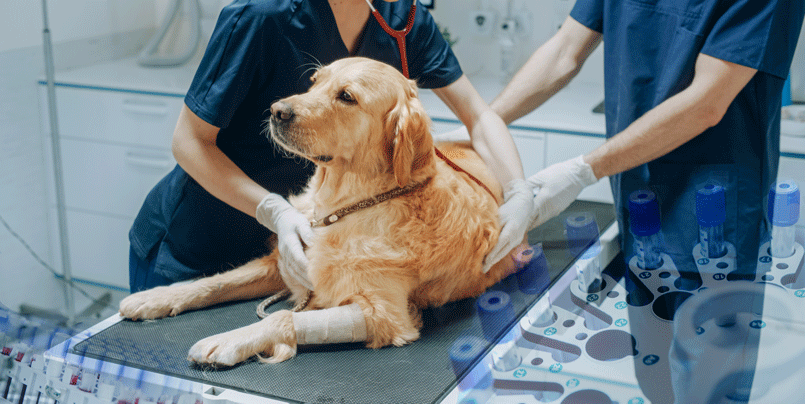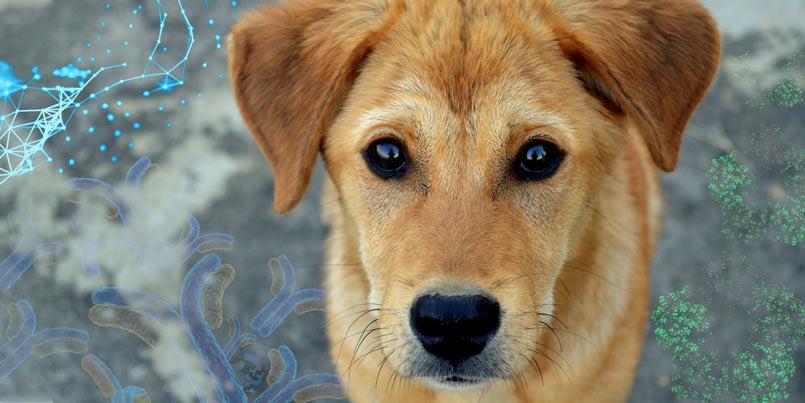Canine CRP
In vitro diagnostic test for quantitative determination of canine CRP in dog plasma and serum
Canine CRP Immunoassay – Test Kit
The Gentian Canine CRP Immunoassay is a Particle-Enhanced Turbidimetric Immunoassay (PETIA) for quantitative determination of canine C-reactive protein (CRP) in dog plasma and serum. The assay is designed and developed using canine specific antibodies. It is an open channel assay that can be applied on a wide range of automated clinical chemistry analysers.
The measurement of canine CRP is important in diagnosis and treatment of inflammatory disorders in dogs. The early detection of canine CRP, enables precise diagnosis and quick individualised patient decisions, resulting in reduced care time and improved patient outcomes. Measuring canine CRP is beneficial for detecting systemic inflammation, rapid diagnosis, analysis of treatment response, and monitoring disease activity.

Background – Canine CRP
C-reactive protein (CRP) is a major acute phase protein in dogs1,2. CRP is synthesised by the liver in response to systemic inflammation due to various disorders including infections, neoplastic diseases, immune-mediated diseases, inflammatory bowel disease, acute pancreatitis, and surgical trauma2,3. In response to inflammation CRP levels rise dramatically up to more than 100 times which can be measured after just 4-6 h and peak at 24-48 h2,3. In addition, CRP levels drop quickly, due to its short half-life, after the inflammation is eliminated2, 3, making CRP a quantitative real-time marker for inflammation.
Insight & Resources Canine CRP
Technical details
| Assay Performance | |
|---|---|
| Sample type | Serum, plasma |
| Assay type | PETIA |
| Format | Two reagents, ready to use |
| Precision* | Total CV < 5% |
| Limit of quantification* | 7 mg/L |
| Reference range | < 10 mg/L |
| Security zone* | up to 1000 mg/L |
| Calibration stability* | 4 weeks |
| Measuring range* | 10-300 mg/L |
*Instrument specific, validation results for Beckman Coulter AU400
For more details on the Gentian Canine CRP Immunoassay products and prices please contact us at marketing@gentian.com
The Gentian Canine CRP Immunoassay is a Particle-Enhanced Turbidimetric Immunoassay (PETIA) for in vitro diagnostic testing of CRP in canine serum and plasma samples. It is an open channel assay that can be applied on a wide range of automated clinical chemistry analysers.
The assay is rapidly performed in only 10 minutes.
For more details on the Gentian Canine CRP Immunoassay products and prices please contact us at marketing@gentian.com
The calibrator for the Gentian Canine CRP Immunoassay is available as a 6-point pre-diluted calibrator kit. The calibrator is adjusted against a commercially available human CRP assay used for Canine CRP determination at the Swedish University of Agriculture Sciences Animal Hospital.
No international standard is available for canine CRP.
For more details on the Gentian Canine CRP Immunoassay products and prices please contact us at marketing@gentian.com
| Product no. | Product | Content |
|---|---|---|
|
1501 |
Gentian Canine CRP Reagent Kit |
R1 45 ml + R2 10.5 mL |
|
1519 |
Gentian Canine CRP Control Kit |
2 Levels: 2 x 0.5 mL |
|
1551 |
Gentian Canine CRP Calibrator Kit |
6 Levels: 6 x 0.5 mL |
For more details on the Gentian Canine CRP Immunoassay products and prices please contact us at marketing@gentian.com
Canine CRP in the clinical setting
CRP is one of the major acute phase proteins produced by the hepatocytes in the liver as a response to inflammation2. Basal CRP levels are very low, but rise substantially during inflammation. The acute phase response is activated very quickly and increased CRP levels can often be detected even before the onset of the clinical signs1. CRP is secreted into the bloodstream and the concentration increases by 100-1000 times during the acute phase, starting to raise within only 6 hours after disease onset reaching maximum levels after 24-48 hours2,3. Canine CRP can not only be analysed to detect and quantitate the degree of systemic inflammation, but also to monitor the treatment response of the patient. If the cause of inflammation is successfully removed, the serum CRP levels drop rapidly due to its half-life of about 19 hours4. The levels of CRP will thus directly reflect the extent of inflammation.
Compared to classical inflammation markers, such as WBC (white blood cell count) and ESR (erythrocyte sedimentation rate), CRP has been shown to have higher sensitivity and better monitoring abilities. This is due to the rapid reduction in CRP levels compared to WBS and ESR when the patient receives efficient treatment5.
Due to the fast expression of canine CRP in cases of inflammation, CRP is also often used for prognostic purposes. One example is monitoring dogs after surgery when they are especially prone to infection6.

Canine CRP in the laboratory setting
The Gentian Canine CRP Immunoassay is rapidly performed in only 10 minutes and can be run on all major clinical chemistry instruments. The assay has a wide measuring range from 10-300 mg/L, with a security zone up to 1000 mg/L. Healthy dogs usually have levels below 10 mg/L with the Gentian Canine CRP Immunoassay. The CRP biomarker is often included in canine health screening profiles, at the same time as being offered as a stand-alone test.
Canine CRP is, in contrast to human CRP, glycosylated at two of five subunits of the CRP protein7. One of the major benefits of the Gentian Canine CRP Immunoassay is the use of canine-specific CRP antibodies produced using the CRP antigen from canine origin in the immunisation process. This leads to antibodies with lower batch-to-batch variability than the CRP antibodies of human origin, as those will have varying degrees of cross-reactivity towards canine CRP8.
The Gentian Canine CRP Immunoassay utilises avian antibodies obtained from the egg yolk of immunised hens, the assay has therefore the advantage of providing reduced interference with mammalian rheumatoid factors, mammalian IgG antibodies, and bacterial or mammalian Fc receptors, compared to assays utilising mammalian antibodies9.

Turbidimetric tests

Faster throughput

Open channel

Quality & Accuracy

10 minutes to result
.png)
Avian antibodies
Contact us for more information and ordering
Gentian's Canine CRP Immunoassay is applied to turbidimetry-based clinical chemistry platforms. It is an open channel assay, meaning it can be added to all clinical chemistry analysers.
- Inflammation marker in serum and plasma
- Canine-specific antibodies ensure consistent specificity to the canine CRP antigen
- Developed and manufactured by Gentian
- Manufactured according to ISO 13485:2016
Explore Canine CRP in your clinical practice and laboratory - fill out the form or send an email to marketing@gentian.com for more information about the product and prices.
FAQ about Canine CRP
Why measure canine CRP in samples from dogs?
The concentration of CRP in plasma/serum increases rapidly and significantly during systemic inflammation. Subsequently, the concentration of CRP decreases quickly when the source of inflammation is eliminated*. Also, measurement of CRP in canine plasma or serum is useful in both diagnosis of sick dogs and in monitoring the treatment response.
Why is the Gentian Canine CRP Immunoassay specific for dogs?
The Gentian Canine CRP Immunoassay is specific for dogs since the antibodies in the assay are produced by immunising hens with purified canine CRP antigen. The species-specific canine CRP antibodies isolated from egg yolk are then used in the production of the Gentian Canine CRP Immunoassay.
How is the Gentian Canine CRP Calibrator standardised?
The Gentian Canine CRP internal calibration is adjusted against a commercially available human CRP assay used for canine CRP determination at the Swedish University of Agriculture Sciences Animal Hospital.
No international standard is available for canine CRP.
What are the benefits of the avian antibodies in the Gentian Canine CRP Immunoassay?
Avian antibodies provide increased sensitivity, as well as decreased background in immunological assays. In contrast to mammalian antibodies, yolk antibodies do not activate the mammalian complement system nor do they react with mammalian rheumatoid factors, mammalian IgG antibodies, or bacterial and mammalian Fc receptors*. Thus, yolk antibodies offer many advantages over mammalian antibodies.
Where can I find more information about canine CRP?
We have created a list of publications and literature featuring canine CRP, you can download the document here.
On which instruments can the Gentian Canine CRP Immunoassay be run on?
The Gentian Canine CRP Immunoassay is an instrument-independent assay, which can be run on all clinical chemistry analysers. Contact us at marketing@gentian.com for more information about applications.
References
-
Eckersall PD, Bell R. Acute phase proteins: Biomarkers of infection and inflammation in veterinary medicine. Vet J. 2010.
-
Ceron JJ et al. Acute phase proteins in dogs and cats: current knowledge and future perspectives. Vet Clin Pathol. 2005.
-
Pepys MB, Hirschfield GM. C-reactive protein: a critical update. J Clin Invest. 2003.
-
Vigushin DM et al. Metabolic and scintigraphic studies of radioiodinated human C-reactive protein in health and disease. J Clin Invest. 1993.
-
Matijatko V et al. Evidence of an acute phase response in dogs naturally infected with Babesia canis. Vet Parasitol. 2007.
-
Christensen MB et al. C-reactive protein: quantitative marker of surgical trauma and post-surgical complications in dogs: a systematic review. Acta Vet Scand. 2015.
-
Caspi D et al. Isolation and characterization of C-reactive protein from the dog. Immunology. 1984.
-
Hindenberg S et al. Evaluation of a species-specific C-reactive protein assay for the dog on the ABX Pentra 400 clinical chemistry analyzer. BMC Vet Res. 2017.
-
Larsson A et al. Chicken antibodies: taking advantage of evolution--a review. Poult Sci. 1993.
This website may contain information about products that are not registered for use in your country of residence and may not comply with applicable laws or regulations in that country. We do not take any responsibility for accessing such information in those circumstances.
.jpg)

.jpg)




